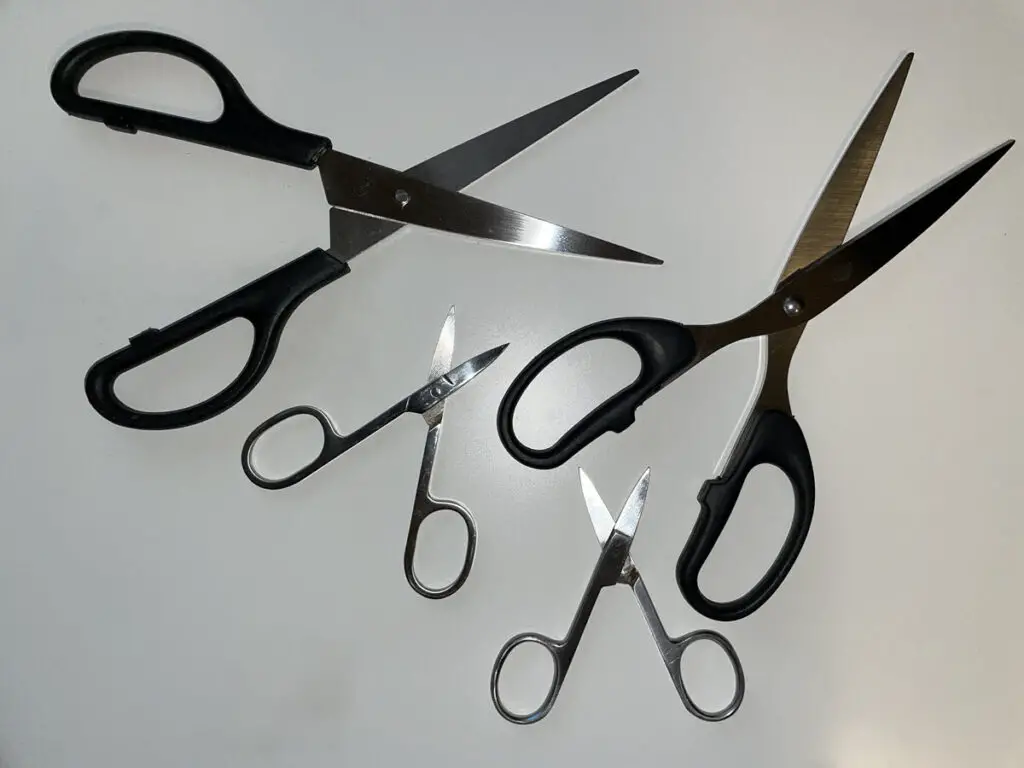Any bladed tool needs to be handled with care, from the moment it’s purchased, throughout its useful life, until it’s eventually disposed of when it is no longer fit for purpose.
Whether it’s a power tool, kitchen or utility knives or a simple pair of household scissors, safe disposal is important to avoid unintended harm to humans or wildlife after you dispose of them. In this article, we’ll take a look at what you need to know about disposing of scissors.
Contents
General Waste Bins And Scissors
You can dispose of scissors in the normal general waste bin that council collections take away at the kerbside. You need to make sure that the blades do not pose any risk for the workers emptying your bins, or anyone else that’s processing your waste.

When you throw scissors away, put them in your general waste bin. While most households have a metals recycling bin for tin cans, they’re not usually suitable for other metals.
Before you place them into your wheelie bin though, you need to make sure that they’re safely prepared in order to minimise the risk of injury to refuse collection staff or those working in waste processing facilities or recycling centres.
Read on to learn more about how to make sure the scissors are safe in your bin.
How To Prepare Scissors To Be Binned
Just like disposing of kitchen knives, you have a responsibility to minimise the risk of injury resulting from the items you put into your household waste bins. In the case of scissors, it’s relatively easy to prepare them.
An easy solution is to wrap the blades of the scissors in sellotape in the closed position. Scissors are designed to be safest in the closed position – just as you’d place them in the kitchen drawer or if you were carrying them.
In addition, wrapping them in cardboard further reduces any risk associated with them being taken away for waste processing.
The Risks To People
You may wonder why scissors can pose a risk to people, especially if you’re throwing them away because they’re blunt and no longer cutting well.
The crew working on your local bin lorries will have no idea what’s hidden in the waste, and the same goes for workers in the depot where your rubbish gets taken. As a result, there’s a chance that anyone handling your waste could grab it, so it’s important to minimise the chance that any rubbish is sharp.
Recycling Scissors
As most scissors are made from metal, they should be recycled. There’s a lot of confusion about waste that doesn’t go into recycle bins, mainly due to a false assumption people make about their general waste bins.
When general waste wheelie bins are described as the place for non-recycling waste, it simply means that it’s for the rubbish that can’t go into your residential recycling bins. It doesn’t necessarily mean that the content of your bin won’t be recycled. In fact, in many areas, the vast majority of waste is recycled, even if it comes from general waste collections.
If you’re going to the tip, you can also put scissors into the metal waste skips – that will also mean that they’re recycled wherever possible. It’s probably not worth making a special trip though, especially if you drive, as the emissions would be likely to offset or even exceed the benefit of recycling them.
When They’re In Good Condition
If you’re getting rid of scissors that are still in good working order, why not gift them to a friend, relative, neighbour or colleague, or donate them to a local business, charity or good cause?
We’ve all found ourselves wondering where we’ve misplaced things like staplers, hole punches or tools like hammers and screwdrivers, and scissors are no different. If you’re lucky enough to have one pair too many in the kitchen drawer, someone you know will almost certainly be grateful to take them off your hands.
Re-use is far better than recycling, so why not do a good deed and gift them to somebody else?
